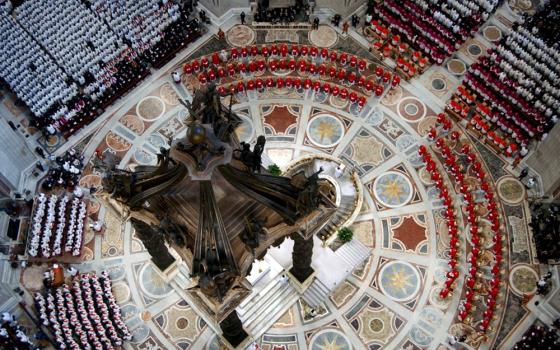Pope Francis' address to the leaders of CELAM, the bishops' conference of Latin America and the Caribbean, will prove to be the most studied of the Holy Father's talks in Rio de Janeiro. It brought together many themes he has been discussing in his morning sermons at daily Mass into a coherent whole and painted a picture of his own vision for the church.
That is not quite right: The vision is not "his own," which is one of the reasons it is so compelling. It is the vision at the heart of the Gospels.
The text is profoundly outward-looking. As Pope Francis has said many times now, he thinks it is a great danger when the church becomes self-referential. From start to finish, the speech is a call for a missionary church:
Missionary discipleship is a vocation: a call and an invitation. It is given in the "today," but also "in tension." There is no such thing as static missionary discipleship. A missionary disciple cannot be his own master -- his immanence is in tension toward the transcendence of discipleship and towards the transcendence of mission. It does not allow for self-absorption: either it points to Jesus Christ or it points to the people to whom he must be proclaimed. The missionary disciple is a self-transcending subject, a subject projected towards encounter: an encounter with the Master (who anoints us as his disciples) and an encounter with men and women who await the message.
Here we see the theme of "encounter," which is so prominent in the spirituality of Focolare and Communione e Liberazione, two of the most vibrant ecclesial movements in the church today. Their vibrancy comes from this living "in tension," the focus on both the Master and "those who await the message," never looking to oneself. He employs an image from the church fathers: the church must be the "mysterium lunae," the mystery of the moon, which does not produce its own light but refracts the light of Christ.
The ecclesiological vision of Pope Francis challenges many of our ways of thinking. "Christ's followers are not individuals caught up in a privatized spirituality, but persons in community, devoting themselves to others," he states. "The Continental Mission thus implies membership in the church. An approach like this, which begins with missionary discipleship and involves understanding Christian identity as membership in the church." Too often, I fear, especially in the U.S., we fall prey to this "privatized spirituality." We recognize the real presence of the Lord in the Eucharist, but we fail to recognize him in the lived ministry of the church. As a result of our interreligious dialogue, Christians sometimes refer to themselves with their Jewish and Muslim brothers and sisters as "people of the book," but Christians are not people of the book. Christ did not pass on his ministry and mission to a text but to a group of persons, the church, and the Blessed Mother did not give birth to a Summa. The pope not only repeatedly recognizes the incarnational nature of the church, but he notes especially that it is the poor and ordinary people who most readily grasp this in their popular piety.
Pope Francis warns against the temptation to reduce the Gospel to an ideology, something manufactured and, just so, capable of manipulation. He specifies four subgroups of this temptation. Let us take each of them in turn.
First, sociological reductionism. Here the church adopts the attitudes and the perspectives of the social sciences uncritically. Pope Francis notes market liberalism and Marxism as among the culprits, but I would also suggest, as I have before, that the U.S. bishops' religious liberty campaign has too often fallen into this trap, taking an understanding of rights derived from the Enlightenment and uncritically invoking it as if it were easily compatible with Christian thought. The tensions within Dignitatis Humanae are real and, sadly, unresolved, and John Courtney Murray knew it.
Second, psychological reductionism. We live in a therapeutic age in which it is all too easy to think that the objective of faith is the attainment of earthly contentment. Even those who defend the faith point to its salutary effects. This has always struck me as odd, given that our faith lives in the shadow of the cross or it does not live at all. The Gospel may bring comfort; it should bring challenge; but, to paraphrase Balthasar, it is either grasped and embraced as the definitive triumph of unconditional love revealed in the cross, or it is not grasped at all.
Third, Gnosticism. Pope Francis notes that this was the first heretical affliction of the church, and an understandable one: Amidst all the misery and suffering of humanity, it is much easier to postulate a God who is disembodied and calls His disciples to a similar ethereal state. This denies the Incarnation and the Crucifixion and turns the Gospel into Play-Doh with which we can make of what we want. The pope of the slums, obviously, has no use for a disembodied spirituality.
Fourth, Pelagianism. Here it is worth quoting the entire paragraph:
The Pelagian solution. This basically appears as a form of restorationism. In dealing with the Church's problems, a purely disciplinary solution is sought, through the restoration of outdated manners and forms which, even on the cultural level, are no longer meaningful. In Latin America it is usually to be found in small groups, in some new religious congregations, in exaggerated tendencies toward doctrinal or disciplinary "safety." Basically it is static, although it is capable of inversion, in a process of regression. It seeks to "recover" the lost past.
The phrase "a purely disciplinary solution" rings true to the ears. So, too, does the phrase "exaggerated tendencies toward doctrinal or disciplinary 'safety.' " If you are not sure what he is talking about, just tune into EWTN for a couple of hours. The pope is not merely an indictment of the Traditional Latin Mass brigade. The restorationist project, the desire to return to a Golden Age, usually situated in the early 1950s, is about more than liturgy. In another section of the talk, the Holy Father says:
Responding to the existential issues of people today, especially the young, listening to the language they speak, can lead to a fruitful change, which must take place with the help of the Gospel, the magisterium, and the church's social doctrine. The scenarios and the areopagi involved are quite varied. For example, a single city can contain various collective imaginations which create "different cities." If we remain within the parameters of our "traditional culture," which was essentially rural, we will end up nullifying the power of the Holy Spirit. God is everywhere: We have to know how to find him in order to be able to proclaim him in the language of each and every culture; every reality, every language, has its own rhythm.
How often do those who adopt the "culture warrior" stance seem to be railing against, rather than engaging, the modern, urban culture? They prefer a "safer" culture, a more traditional rural culture, in which the priest's authority was unquestioned, and forget that God is active here and now in all cultures, rural and urban, traditional and nontraditional. It would be interesting to see how many U.S. bishops who adopt the culture warrior stance actually grew up in a rural culture.
The pope also warns against functionalism, turning missionaries into managers and thinking that the "results" of our efforts are completely reliant upon our own exertions. This leaves no room for the Holy Spirit. He warns, too, against clericalism and points out that clericalism is as often sought by the laity as by the clergy: "Curiously, in the majority of cases, it has to do with a sinful complicity: the priest clericalizes the layperson and the layperson kindly asks to be clericalized, because deep down it is easier," he says. He calls for bishops who "must be pastors, close to people, fathers and brothers, and gentle, patient and merciful. Men who love poverty, both interior poverty, as freedom before the Lord, and exterior poverty, as simplicity and austerity of life. Men who do not think and behave like 'princes.' Men who are not ambitious, who are married to one church without having their eyes on another. Men capable of watching over the flock entrusted to them and protecting everything that keeps it together: guarding their people out of concern for the dangers which could threaten them, but above all instilling hope: so that light will shine in people's hearts. Men capable of supporting with love and patience God's dealings with his people." I invite the nuncios of the world to ponder these words before drawing up their next terna. More importantly, Pope Francis notes that he invited the nuncios of the world to ponder these words before drawing up their next terna.
OK, I admit it. I am smitten. I noted yesterday that Pope Benedict's talks had a density I came to appreciate. Pope Francis' mind is of a different sort. He may not have the theological credentials of his predecessor, but he is no theological neophyte either. As was pointed out to me by a Latin American bishop after his election, Pope Francis is extraordinarily astute, and that shines through in this text. This is a man thoroughly centered, as one would expect a man rooted in the Spiritual Exercises to be. And in this speech, he invited not only the bishops of Latin America and the Caribbean to steep themselves in the missionary spirit of the first apostles; he is really inviting all of us to do so. Look to the Master and walk to the periphery. That is the agenda that is not really an agenda, reliant not on our plans but upon the "encounter." Pope Francis said: "The 'today' is closest to eternity; even more: the 'today' is a flash of eternity. In the 'today', eternal life is in play." Watching him this past week, who can doubt that "eternal life is in play."






